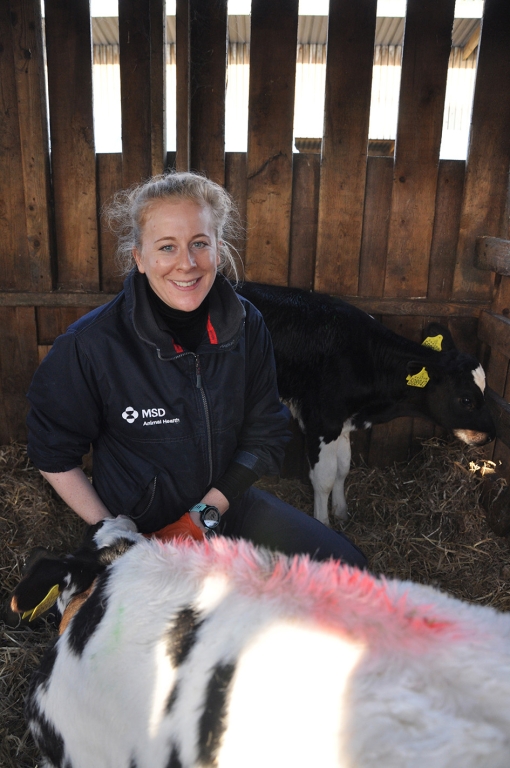
Dr Kat Baxter-Smith suggested the role of bovine coronavirus within the calf respiratory disease complex needs to be taken more seriously
Bovine Coronavirus The Most Prevalent Virus Found In Routine Screening For Calf Respiratory Disease
Recent UK studies show bovine coronavirus (BCoV) as being the most prevalent virus found in routine screening during calf respiratory disease outbreaks.
Calf respiratory disease is widespread (described as inevitable by some farmers) and comes at a high cost from an emotional and business productivity perspective. It’s a classic iceberg disease and one which is continually highlighted as a critical area for overuse of antibiotics. Despite this background, there is an under use of vaccination in the UK cattle sector.
Calf serology on 59 UK farms known to have had a history of respiratory disease issues (2021-2022) reported 91.5% of samples being positive for BCoV.
Speaking at the National Youngstock Conference (HAUC, 20th July 2023), Dr Kat Baxter-Smith from MSD Animal Health UK (a division of Merck & Co., Inc., Rahway, N.J., USA (NYSE: MRK)) suggested coronavirus needed to be taken more seriously as a respiratory pathogen by veterinary practitioners and the UK cattle industry – just as human health experts have had to change their mindset following the Covid-19 pandemic.
“While BCoV is a relatively well-known cause of neonatal calf diarrhoea – and the same virus as the respiratory variant – its role and impact in calf pneumonia has been less well defined. However, our latest diagnostic data certainly shows its overwhelming presence during calf respiratory disease outbreaks in the UK,” she said.
Dr Baxter-Smith explained that there may be a link between initial respiratory infection and intestinal infection because the virus is produced in the respiratory tract and then swallowed with the copious quantities of mucus generated during infection.
“Indeed, an association has been shown recently between detection of BCoV in calf faeces and detection of BCoV in cases of pneumonia on the same farm1,” she said.
She added that the fact BCoV is frequently isolated alongside other, perhaps more recognised respiratory isease pathogens such as BRSV, M. haemolytica, Pi3 and M. bovis, suggests an interplay between these organisms.
“Research has already shown that BCoV infection disturbs the protective mucus lining of the thoracic tract2. It may therefore be that BCoV ‘opens the door’ for the other viral and bacterial pathogens to establish themselves and cause disease,” she explained.
“Whilst the pathogenicity of BCoV within the BRD complex remains an unknown quantity, its ubiquitous presence in the UK cattle population – and the recent human experience of coronavirus as a significant respiratory pathogen – suggests the need for some re-evaluation.”
“Calf respiratory disease is a multifactorial complex with a range of inciting pathogens often implicated. Consequently, to maintain effective control, it is important for farmers work closely with their vet on the development and implementation of a bespoke action plan for their own farm situation,” recommended Dr Baxter-Smith.
“Maximising a calf’s own ability to resist disease by focusing on excellent colostrum management combined with a robust vaccination programme is key. Essentially, the focus for modern calf rearers should be immunity-led disease prevention – and that’s where the input of a good vet is priceless.
“For example, the vet can quickly help you identify the ‘pinch points’ – or key disease risk areas/weaknesses – in your system, whether during or shortly after calving, in the individual or group rearing pens, at weaning or in the later growth stages.
“Calves can suffer pneumonia lesions to their lungs from as young as two weeks of age, so early and appropriate vaccination against respiratory disease can often tip the balance towards more effective control,” she said.
More from MSD Animal Health
- AHDB data highlights opportunity to strengthen abortion control in UK flocks
- Rising Lungworm and Resistance Fears Prompt Vaccination Advice Pre-Turnout
- Practical Webinar Helps Beef Farmers Tackle Costly Scour Issue
- Data Highlights Gaps in Calf Scour Control on GB Farms
- MSD Animal Health Launches 2026 FlockCheck Scheme Early to Help Tackle Reproductive Losses in Sheep

 3 years ago
3 years ago  1140 views
1140 views
